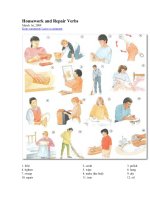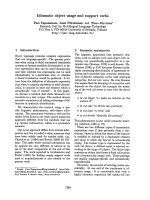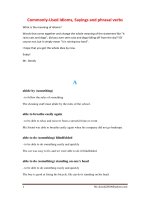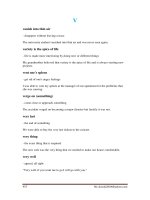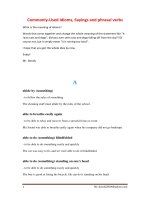Finite and nonfinite verbs
Bạn đang xem bản rút gọn của tài liệu. Xem và tải ngay bản đầy đủ của tài liệu tại đây (37.5 KB, 18 trang )
Finite and non-finite verbs
Mr. Anh
Verbs
Tense
Form
Finite verb
Non-finite verb
He wants to read a book.
“wants“ is a finite verb. It is in present simple.
“to read“ is a non-finite verb. It is an infinitive.
There are twelve basic tenses and many
supplement tenses in English.
There are 7 kinds of non-finite verbs in English.
7 non-finite verbs
1.V: after make, bid, let, etc.
Ex: He made them clean the toilets.
2. To V: order, cause, tell, etc.
Ex: He ordered them to clean the toilets.
3. V-ING: avoid, busy, worth, etc.
Ex: She avoids cooking in the kitchen.
4. V-ED (PP): (passive meaning) see, observe, etc
Ex: She saw a man hit by a car.
5. To V or V: help, know
Ex: He helped her wash the dishes.
He helped her to wash the dishes.
6. V or V-ING: verbs of perception: see, hear, etc
Ex: He heard her sing in the room.
He heard her singing in the room.
7. To V or V-ING: remember, forget, like, etc.
Ex: I remember lending you some money.
I remember to lend you some money.
To learn English, he has bought many books.
Learning English, he feels happy.
He goes to a center to learn English.
Bitten by mosquitoes, he feels itchy.
You are the last to be introduced.
The only man to possess USD 86 billion is Bill Gates.
She reads a book, lying in a hammock.
She reads a book lying on the table.
Use the correct form of the verb in the
parentheses
1. My friend promised (return) the book very soon.
2. Most people enjoy (write) letters to their friends.
3. Tom avoids (study) his lessons as long as possible.
4. Did you offer (translate) those letters for them?
5. Davis finished (write) the report about four
o'clock.
6. How soon do you expect (leave) for South
America?
7. Senator Robert refused (eliminate) any of the
major points.
8. Have you ever considered (try) something
different?
9. Are you going to suggest (travel) by plane or not?
10. Did they promise (reserve) some good seats for
us?
Use the correct form of the verb in the
parentheses
1. How can anyone resist (like) that charming girl?
2. We don't want (risk) (lose) our money that way.
3. I don't intend (tell) anyone about my plan yet.
4. For a while, we consider not (go) with them.
5. The children promised not (do) that part of the
lesson.
6. I don't deny not (understand) that part of the
lesson.
7. Why don't you offer (help) him with that work?
8. I hesitate (suggest) any changes at this time.
9. Jack delayed (write) the letter as long as
possible.
10. I don't advise (study) for very long periods of
time.
Use the correct form of the verb in the
parentheses
1. Her wish is (see) her son again.
2. She wanted the letter (send) at once.
3. We couldn't enter the room because we found
the door (lock).
4. I hate (interrupt) you, but I have to.
5. The old man recollected (save) a boy in the river.
6. The host prevented his dog (bite) the strangers
by tying it.
7. She missed (attend) the meeting.
8. The guide requested the guests not ( touch) the
exhibits.
9. The police consented (let) the cameraman in.
10. The debtor escaped (meet) the lender.
Use the correct form of the verb in the
parentheses
1. He begged me (give) him some money.
2. They believed her (operate) the machine.
3. It is no good (talk) all the time.
4. Seeing his funny face, she could not help
(laugh).
5. It will make difference (try) at this time.
6. The council determined (vote) for her.
7. The hunter taught her (play) a kite.
8. We understand (collect) money for the old
teacher.
9. Mrs Thuy was busy (iron) clothes yesterday.
10. Ly Thong entreated the king (forgive) him and
his mother.
Use the correct form of the verb in the
parentheses
1. It was difficult (obtain) a pair of trousers twenty
years ago.
2. He has had a lot of difficulties (earn) his living in
the city.
3. Truong Son always wants (take) to a restaurant.
4. She likes (admire) everywhere.
5. That middle-age woman has been looking
forward to (get) married for a long time.
6. Long expects (win) a lottery ticket.
7. Uncle Ho desired (see) our people with enough
foodstuff, clothes and schooling.
8. There is no use (complain) about every difficulty.
9. Dao is interested in (watch) film.
10. We can not meet the director because he is
busy (interview) new employees.
Choose the correct completion
1. Those who learn and work hard are worth ....
A. praising
B. being praised C. having praised
D. to praise
2. Hens always prevent their chicks ... .
A. hurting
B. to be hurt
C. being hurt
D. hurt
3. We saw a motorcycle ... under a big truck.
A. to smash B. smash
C. smashing
D. smashed
4. Bui Kiem had expected ... in his class.
A. award B. awarded
C. to be awarded D.
awarding
5. ... goodbye to the lover, the new recruit left his
village.
A. Saying B. Having said
C. To say
D. To
be said
6. The fastest runner deserved ... the prize.
A. to get B. getting
C. got
D. get
7. In prison the soldier resisted ... by the enemies.
A. to tempt B. being tempted C. tempting
D. tempted
8. His face was very funny. She can't help ....
A. laugh B. to laugh
C. laughed
D.
laughing
9. Kim Thuy is a very skillful tailor. She is good at ...
clothes.
A. make B. to make
C. making
D.
made
10. Manh escaped ... the toilet.
A. cleaning B. to clean
C. cleaned
D. clean
